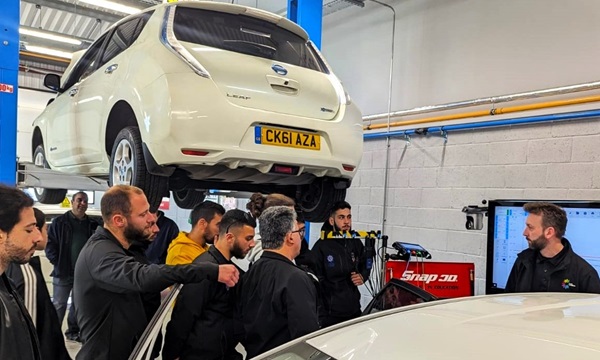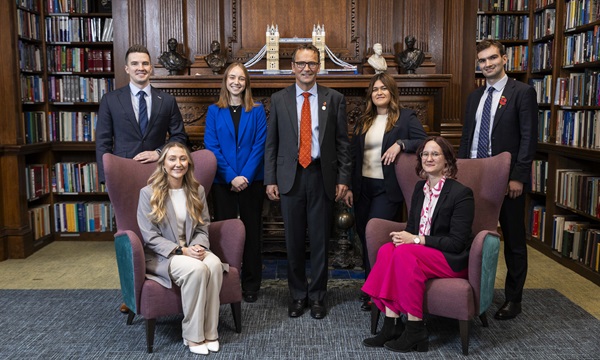Businesses, employees, educators and policy makers are coming together to create an industrial skills blueprint to train new and existing industry talent.
Make UK is launching the Industrial Strategy Skills Commission to find a solution to the ‘growing skills deficit’ in manufacturing and engineering across the country.
It has brought together experts in education, training and industry to diagnose the wide scale problems in the skills system and create an effective talent pathway into manufacturing.
It says this skilled workforce pipeline will be critical to the success of the UK Government’s new Industrial Strategy to drive growth and digital transformation in manufacturing over the next few years.
Co-chaired by former Minster for Skills, Apprenticeships and Higher Education Robert Halfon and former Deputy Leader of the Labour Party Tom Watson, Baron Watson of Wyre Forest, the Industrial Strategy Skills Commission will identify key priorities that Government must address to support vital skills creation, while highlighting emerging issues so industry and Government can respond effectively. The Commissioners will be supported by an advisory group of leading education experts, industry experts and policy makers.
Commission members:
- Co-chair – Robert Halfon, former Minister of State for Apprenticeships at the Department for Education
- Co-chair – Tom Watson, Baron Watson of Wyre Forest
- Kevin Fitzpatrick CBE, former Senior Vice President for Manufacturing and supply Chain Management Europe, Nissan Motor Corporation
- Sian Elliott, Head of Organising, Service and Skills, TUC
- Fiona Aldridge, CEO, Skills Federation
- Dame Judith Hackitt DBE FREng, chemical engineer, former Chair of HSE and currently Interim Chair of the Office for Nuclear Regulation
- Dr John Neill CBE, former Executive Chairman Unipart
Advisory Board:
- Ann Watson, CEO Enginuity, charity focusing on closing skills gap across manufacturing and engineering
- Stephen Evans, CEO, Learning and Work Institute
- Dr Hilary Leevers, CEO, EngineeringUK
- Neil Carberry, CEO, Recruitment and Employment Confederation
- Yiannis Koursis OBE, CEO, Bedford College
- Rowan Crozier, CEO of Birmingham-based metal stamping and precision toolmaking specialist Brandauer
- Simon Connell, CEO, Baker Dearing Educational Trust – supporting 44 Technical Colleges across England
- Professor Liz Mossop, Vice-Chancellor, Sheffield Hallam University
- Ben Rowland, CEO, Association of Employment and Learning Providers
- Clare Porter, Director for Strategic Engagement, Workforce and Skills, High Value Manufacturing Catapult and former Head of Manufacturing Policy and the Department for Business and Trade
- Brian Holliday, member of the Executive Management Board of Siemens plc, Chairman of Siemens Digital Industries and Chairman of Siemens Industry Software UK
- Philip. Bouverat, Director , JCB
Manufacturers are still struggling to recruit with some 58,000 unfilled live vacancies, while the talent pipeline continues to decline at an alarming rate. Apprentice starts are down 42% since the Apprenticeship Levy was introduced seven years ago and T-levels, designed to deliver much-needed technical skills into industry, still do not have the required uptake to make a meaningful difference.
Over the coming months, the Industrial Strategy Skills Commission will meet regularly, supported by an advisory board from across the skills and industry spectrum. The Commissioners will draw from a mix of written evidence from the widest possible range of stakeholders and will make on-site visits to manufacturers and training providers to look at best practice as part of their solution gathering. Their findings will be reported into the Government early next year.
Robert Halfon, Co-Chair of Make UK’s Industrial Strategy Skills Commission said:
“The new Industrial Strategy Skills Commission has urgent work to do. This unique bringing together of business, industry, government, educational experts and providers and policy makers must change the perceptions of working in industry and find the quickest and most effective way of attracting the best talent into the engineering and manufacturing sectors.
“The new Government has committed to reforming the current Apprenticeship Levy and replacing it with a Skills and Growth Levy. But it is imperative that we make sure this new levy provides enough of the right apprenticeship opportunities at all levels so that employers across the length and breadth of the country have access to the skills they and our country need to grow.”
Tom Watson, Baron Watson of Wyre Forest and Co-Chair of Make UK’s Industrial Strategy Skills Commission, added:
“I have long advocated for a robust Industrial Strategy and supported Make UK in highlighting how the United Kingdom was unique among advanced economies in lacking such a strategy, a gap which has stifled our industrial success.
“Labour’s new Industrial Strategy will be pivotal in reigniting growth and providing a much-needed boost to British industry, which requires a stable environment to foster investment, unlike the inconsistent initiatives of recent years. At its core, the strategy must include a dynamic and practical skills plan to supply the trained workforce businesses desperately need to thrive.”
Stephen Phipson CBE, CEO of Make UK, the manufacturers’ organisation, said:
“The Industrial Strategy can only succeed if businesses have access to people with the right skills. The new Industrial Strategy Skills Commission will look at the cumulative training and recruitment issues currently facing the manufacturing sector and drill down for the best solutions.
“Our latest research is showing the demand for companies looking to upskill their current workforce continuing to rise at a time that the pipeline for technical teachers is declining. Add to that the fall in the number of new people coming into the sector, an ageing workforce and more people than ever taking early retirement, the result is significant skills gaps across the workforce which need to be tackled quickly if industry is to grow and prosper.”
The new Industrial Strategy Skills Commission will shortly issue a written call for evidence in order that the widest possible number of companies across the whole of the manufacturing sector can contribute to make sure the solutions work for all companies, large and small. The Commission will also be hosting targeted evidence panels to delve deeper into specific issues within the skills system.







